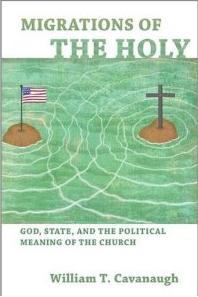I have read a staggering number of books that claim the subject “political theology.” Many of these books fail at a fundamental level. In attempting to allow Christians a voice in the public square, they “translate” particular Christian beliefs into a supposedly more “universal” language that all reasonable people should be able to attend to. The reason such a move is considered necessary is because the nation-state is viewed as the agent through whom politics is done. For many, “to be political” means to engage with the government. For the church “to be political,” therefore, means for the church to attempt to influence elections and the actions of elected officials.
theology.” Many of these books fail at a fundamental level. In attempting to allow Christians a voice in the public square, they “translate” particular Christian beliefs into a supposedly more “universal” language that all reasonable people should be able to attend to. The reason such a move is considered necessary is because the nation-state is viewed as the agent through whom politics is done. For many, “to be political” means to engage with the government. For the church “to be political,” therefore, means for the church to attempt to influence elections and the actions of elected officials.
For some time many of us, and many authors of books categorized as political theology, have suspected that this is not quite right, but have been unable to put words to it. Many books on political theology fail fundamentally because while they attempt to articulate a vision of the political relevance of the church, they are unable to break free from the assumption that at the end of the day the church is relevant – or not – insofar as she can influence secular government.
This is the myth that William T. Cavanaugh’s book Migrations of the Holy confronts and shatters. The central argument of the book is that the apparent secularization of Western society is only apparent. He says
In important ways, the United States has not really secularized at all. What has happened instead is that in the modern era the holy has migrated from the church to the state. By this I do not mean that Christian evangelicals have an inordinate influence in the current administration. I mean that faith in the United States and in “secular” Western values can take on the status of a religious conviction, and the United States has assembled the largest military in history to propagate it. (112)
Cavanaugh pursues this central argument through a series of interconnected essays, examining a host of issues: American exceptionalism and America/democracy/freedom as an object of worship, relocating the just-war doctrine within the church rather than the state, the church’s perspective on national borders, the problem of the sinfulness of the church, the problem of the church’s history involving torture, and the best account I’ve seen yet of Augustine’s City of God in its application to contemporary political theology.
As a writer, Cavanaugh is visibly improving with each book he publishes, and I would confidently say that this is his best book yet from the standpoint of clarity and accessibility. It ought to be satisfying to trained theologians, while 90% of the book is easily understandable to the average lay person. And unlike some of his heavy-hitting books in the past, this one comes in at a quite achievable 198 pages.
If I have any criticisms of this book, I can only do so only because Cavanaugh raises both expectations and possibilities in the area of political theology with this book, but does not quite manage to achieve them. It is without a doubt the best introduction to thinking politically about the church on the market. That said, this is a collection of essays, and in a couple of places that shows. The book lack a concluding essay or afterward, and feels like it just stops. And while Cavanaugh offers some very tantalizing practical applications at points during the book, the implied promise never quite materializes, and the reader is left wondering, “So what now?” (The book I am tentatively outlining now is my proposed answer to that question.)
With all that said, I thank God for this book. It is the book I will recommend to all of my friends when they ask for help understanding the political implications of the gospel. I am eagerly awaiting critical reviews, and I can confidently predict that no theologian will be able to ignore the contents and presentation of this book.
Watch for it over the next couple of weeks as I plan to summarize each chapter critically here and push back a bit about the practical implications of Bill Cavanaugh’s ideas.
